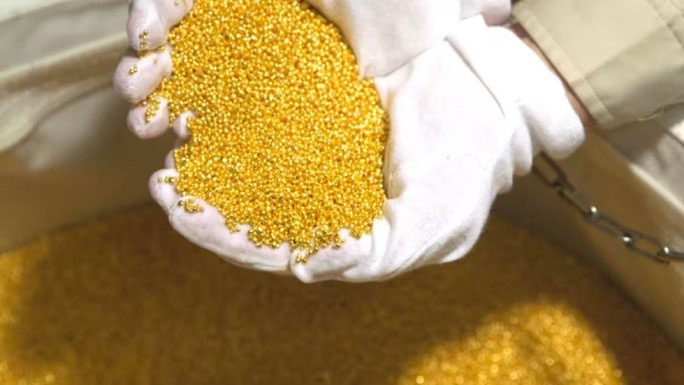Japan, with its limited natural resources, is emerging as a promising market for extracting gold and precious metals from “electronic waste.”
Nikkei Asia reports that a factory in Hiratsuka receives tons of electronic circuit boards and jewelry every day. The scrap is melted down to extract gold, which is then formed into bars or round coins. This factory collects electronic waste not only from Japan but also from across Southeast Asia, processing approximately 3,000 tons of “e-waste” each year.

Gold extracted from electronic waste in Japan. (Photo: Nikkei Asia).
Mitsubishi Materials Corporation (Japan) aims to process 240,000 tons of waste annually by the end of the fiscal year 2030, up from approximately 160,000 tons at present.
The Japan Sustainable Design Institute estimates that about 5,300 tons of gold are accumulated in Japan, which is equivalent to 10% of global reserves.
According to the Japanese Ministry of the Environment, an average of 280 grams of gold can be recovered from every 10,000 broken phones. Extracting gold from electronic waste is 56 times more efficient than mining gold from natural sources.
The Japanese government is promoting the recycling of gold and other precious metals from electric vehicle circuit boards to enhance economic security.
In August, Japan agreed to establish a common framework with Southeast Asian countries regarding resource recycling. Their goal is to expand international cooperation to secure a supply of electronic waste.
Additionally, Japan has implemented regulations to limit the export of electronics to other countries. Currently, only a few nations effectively exploit this gold resource.
The World Gold Council (WGC) reports that global recycled gold supply currently stands at 923.7 tons, an increase of 10% compared to the same period last year, far exceeding the mining sector’s growth rate of about 3%.
Recycled gold now accounts for less than 30% of the global supply. The WGC states that only about 200,000 tons of gold have been mined throughout history.
“With mining output stagnating, turning to gold sources from smartphones, old appliances, and other scrap is becoming increasingly important. Several companies in Japan are expanding their capabilities to collect and process urban metals to meet rising demand,” Nikkei Asia assessed.


















































